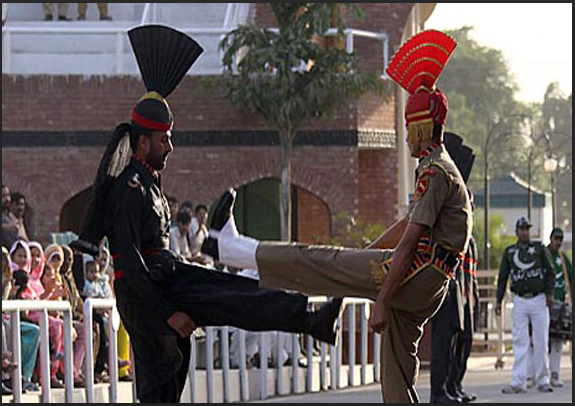Hostilities Continue as New Delhi And Islamabad Exercise no Restraint
India Pakistan tensions escalate with PM Modi saying "old habits will not be tolerated."

NEW DELHI:On Thursday, India’s Prime Minister Narendra Modi -- who has come under attack for his silence on the hostilities -- cautioned Pakistan that its actions will “not be tolerated.”
Speaking at an election rally in Maharashtra, Modi said, “Today, when bullets are being fired on the border, it is the enemy that is screaming… The enemy has realised that times have changed and their old habits will not be tolerated.” Earlier, Modi had responded to a question on the cross-border firings with a muted and vague, “everything will be fine soon.”
The Prime Minister’s changed stance comes after politicians in Maharashtra -- set to go to the polls on October 15 -- reminded Modi that he should be focusing on stopping the “atrocities” being committed by Pakistan, and not busy campaigning for the BJP in the state.
Leading the attack is former BJP ally, the Shiv Sena, with Uddhav Thackeray who took a dig at the Prime Minister for not having the resolve to deal with the border crisis. “Do you need a 56-inch chest to protect the interests of the nation and to teach Pakistan a lesson for their misdeeds? All you need is a strong will power to give it back to them in the same measure,” Thackeray said.
Congress leader Rahul Gandhi too joined the attack. “Our PM was sitting on a swing with the Chinese president while Chinese soldiers made incursions into India. Over the past few days, Pakistan has been firing from across the border, leaving our soldiers dead,” Gandhi said.
As a result the government at the centre seemed compelled to up the ante against Pakistan. Modi’s strong words follow Defence Minister Arun Jaitley issuing a “stop firing, or else…” kind of warning and a demarche being issued to Pakistan via the High Commission on the same issue. Speaking on Thursday, Jaitley said “If Pakistan persists with this adventurism, our forces will make cost of this adventurism unaffordable for it.” “Pakistan should stop this unprovoked firing and shelling if it wants peace on the border,” the Defence Minister added.
The two countries remain engaged in a tit for tat blaming the other for “unprovoked firing.” Meanwhile, over a dozen civilians have lost their lives in the cross-fire, and close to 20,000 have fled their homes taking refuge in shelters and camps.
Addressing the issue for the first time, Pakistani Prime Minister Nawaz Sharif called on India to honour the ceasefire agreement. As reported by Dawn News, Pakistan’s Prime Minister addressed a National Security Committee meeting attended by Interior Minister Chaudhry Nisar Ali Khan, Defence Minister Khawaja Asif, Adviser to PM on National Security and Foreign Affairs Sartaj Aziz and senior military officials. “PM Nawaz told the meeting that Pakistan's desire for peace should not be misunderstood and called upon India to immediately honour the sanctity of LoC and working boundary and halt firing for durable peace,” the daily reported.
Pinning the blame for the aggression on India, Pakistan maintained that its exercising “utmost restraint.” National Security Adviser Sartaj Aziz said, “Unfortunately, all our efforts to secure peace and tranquillity on the Line of Control and the Working Boundary have elicited no cooperation from the Indian side.”
This round of firing began on Monday, after a calm September that in turn, followed an August that was witness to heavy exchanges of gunfire and shelling between border posts and left at least six people dead.
The hostilities come on the heels of the cancellation of secretary-level talks over Pakistan’s decision to meet Kashmiri separatist leaders in August. The talks had signalled the prospect of renewed ties between the two countries, after Indian Prime Minister Narendra Modi invited Pakistani counterpart Nawaz Sharif to attend his swearing-in ceremony, with the two leaders meeting in New Delhi on the same occasion.
Speaking at the United Nations last month, Sharif said that India’s decision to cancel the talks had resulted in a “missed opportunity.” Modi, speaking at the UN the next day, responded saying that India was not opposed to talks, but would not participate “in the shadow of terror” and that it was upto Pakistan to “create a conducive atmosphere for talks.”



